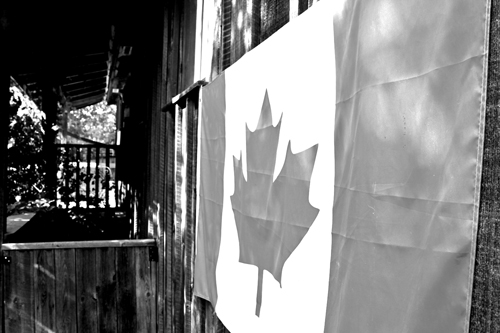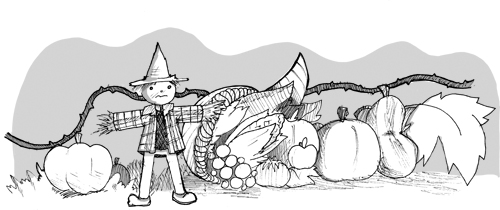Professor Stevens says Canadian Thanksgiving, always second to its American counterpart, should be recognized in its own right
Melissa Leone
Contributor

There are two kinds of Thanksgiving dinners. One takes place in a sedate family setting, with a humble meal of turkey and pumpkin pie, and an early bedtime. The second bears a feast, along with football, parades, and a red, white, and blue flag plastered on the forehead of everyone around the dinner table.
While we celebrate many holidays in the same way as our neighbours to the south, Canadian Thanksgiving seems to be the butt of many jokes in popular culture, paling in comparison to the rambunctious American Thanksgiving. But why is it that Canadian Thanksgiving is not taken seriously?
Professor Peter Stevens from York’s Writing Department attributes this to a fundamental difference between American and Canadian culture, namely that Canadians celebrate Thanksgiving in a relatively discrete way that does not glorify the holiday to the same degree as Americans do.
Stevens says Canadian Thanksgiving has continued to evolve throughout history. He is careful to note that there are some traditions we share with America, such as harvest decorations, leisure time with family, and having a large family meal on Thanksgiving, a tradition Canadians actually adopted from America.
Canadian Thanksgiving was originally a religious holiday, a day for Protestants to give thanks for their blessings.
This changed when the holiday started to revolve around the joy of consumption.
Stevens explains Thanksgiving offered labourers a rare break from the daily toil.
“Rather than spending this time at church, many of them began to spend the holiday at dance halls, dime museums, and on other commercial amusements,” says Stevens, adding that the government shifted the holiday from a Thursday to a Monday at the request of railway companies, who thought a longer weekend would be better for business than a mid-week holiday.
“By the end of the 20th century, Thanksgiving Day had largely shed its religious and nationalist associations,” says Stevens. “Thanksgiving Day [changed] to give the holiday a more diverse character that was more in keeping with the pluralism of Canada as a whole.”
We share many traditions with Americans for Thanksgiving, but the differences lie in the philosophies surrounding the holiday in both countries.
Stevens says in the US, Thanksgiving can be extravagant and over-the-top, celebrated with competitive turkey and pie eating contests, the naming of an official alcoholic beverage of the day, midnight parades, and televised specials. American patriotic tradition engulfs the entire Thanksgiving holiday.
The Thanksgiving Classic, where three football games are played on Thanksgiving Day, is another American patriotic tradition that has been around since 1920.
Last but not least, Americans participate in Thanksgiving parades held nationwide.
The parades here in Canada, if they do happen, are smaller, local events.
We don’t have a day of massive sales like Black Friday in the US after Thanksgiving, or an extra day added to the already three-day long weekend like the US does.
Stevens says in the US, Thanksgiving Day coincides with the Santa Claus parade, which adds to the festive nature of the day, and marks the start of the holiday shopping rush.
“Americans tend to view participation in consumer culture as a national birthright,” adds Stevens. “So Thanksgiving Day’s connections to this orgy of consumption provides yet another reason for the holiday’s importance on the American calendar.”
So are Canadians less patriotic than Americans? Do we participate less in consumer culture? Stevens doesn’t think so.
“At the risk of perpetuating stereotypes, I would argue that, as a people, Canadians simply are more reserved than Americans,” he says. “We aren’t ignorant or unpatriotic; we simply prefer to celebrate in a less public, less boisterous manner.”
Stevens says although Thanksgiving is a more important holiday in America, that does not take away from the legitimacy of Canadian Thanksgiving and the significance of the holiday.
The theory may be sound, but in practice, it is certainly difficult to see the parallels between Canadian and American Thanksgiving.
Canadians’ reserved tendencies seem to both cause and perpetuate the confusion of Canadian identity.
When fourth-year film studies major Shahbaz Khayambashi is asked what Thanksgiving means to him, he says it’s simply a day off.
“American Thanksgiving celebrates the slaughter of the native tribes. Canadian Thanksgiving is something of an oddity in that it doesn’t seem to celebrate anything at all. My friend […] claims it has to do with a failed voyage of some sort. So, to me, Thanksgiving is a confusing riddle,” says Khayambashi.
Luca Della Penna, a first-year theatre student, sees Thanksgiving simply, separate from Canada’s identity troubles, as a time to appreciate his friends and family.
“Every year, no matter how many problems are in the air, my family has managed to pull off a full Thanksgiving feast,” says Della Penna. “It’s nice because it gives us some consistency. Things are always changing, but it’s good to know that some things stay the same.”



